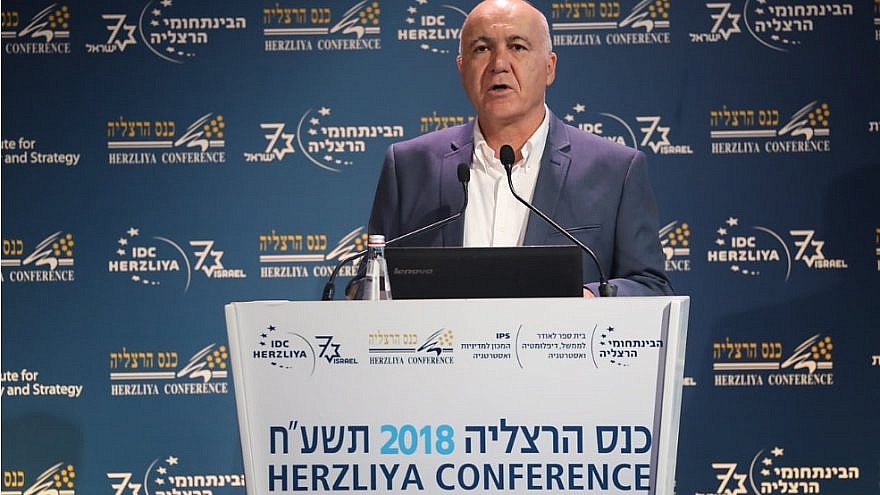In the absence of a realistic opportunity to reach a peace deal with the Palestinian Authority in the coming years, Israel should begin formulating its own policies on how to defend its interests, the former chief of the Israel Security Agency (Shin Bet) Yoram Cohen told the Annual Herzliya Conference.
Cohen said that both sides of the debate on whether Israel should remain in the territories or vacate them advocate scenarios that carry significant risks. “Our dilemma is complex and fateful,” he said. “Any policy we adopt will have significant risks.”
He added that those who want Israel “to remain in Judea and Samaria, and to continue the occupation, know that this maneuver will challenge us demographically, morally, diplomatically and security-wise. It will create ongoing security dangers and risk losing the significant Jewish majority.”
On the other hand, explained Cohen, those calling for an Israeli withdrawal from the territories “create a concern about dealing with the future Palestinian Authority [and] the takeover of extremist Islamic elements who will make the security situation significantly worse, and paying a high social and economic price [by evacuating settlers] for nothing.”
While neither side of the debate could be dismissed, Cohen said his own stance is predicated on the view that reaching “a diplomatic arrangement with the Palestinian Authority is an Israeli interest and should be sought. An arrangement will discernably minimize our control of Palestinians [and] decrease hostility, and suitable security arrangements can be made. This would also maintain the character of Israel as a Jewish and democratic state.”
Nevertheless, Cohen, who ran Israel’s powerful domestic intelligence agency from 2011 to 2016, noted that the gaps between Israeli and P.A. leadership remain too wide for an agreement to be realistic at this time. He pointed out the P.A.’s unwillingness to agree to “appropriate solutions to security threats” in a future deal, as well as its refusal to compromise with Israel on core issues. “This means we cannot reach an agreement with the P.A. in the coming years.”
As a result, Cohen called for the government to begin formulating a detailed policy that would be based on the agreement of the majority of Israelis. This would safeguard security on one hand and preserve Israel’s character on the other until conditions ripen for a future deal.
Pressing a policy of ‘do no harm’
In outlining his own vision for the coming years, Cohen said: “I think Israel should initiate a policy of ‘do no harm’ and ‘do good,’ ” defining “do no harm” as avoiding anything that can lead to a deterioration in security and an uptick in violence, as well as avoiding taking any unilateral Israeli steps in the territories.
Cohen called for any plans to annex “all of Judea and Samaria” to be rejected, as these would create a binational state, ending the reality of a Jewish state.
In defining “do good,” Cohen called for Israel to clearly set out its position on the issue of Jerusalem, Palestinian refugees and security arrangements. Future settlement building should be focused on the major blocs, he said. And ongoing counter-terrorism missions, which have prevented Hamas from creating a terror base in the territories, must continue, he added.
Cohen maintained that the Palestinian people remain divided into two opposing, feuding leaderships: the Palestinian Authority in the territories and Hamas in the Gaza Strip.
The P.A.’s position is based on reaching an agreement with Israel, but has shifted in recent years to challenging Israel in the international arena, attempting to force it to change its policies. Hamas’s position remains that of violent conflict with Israel.
But in recent years, Cohen added, the main objective of each Palestinian leadership was to prevent the other from reaching achievements and weakening the other.
Cohen said he expected this situation to continue into the foreseeable future, noting that the P.A. is facing diplomatic distress, while Hamas’s major distress remains economic and domestic.


























